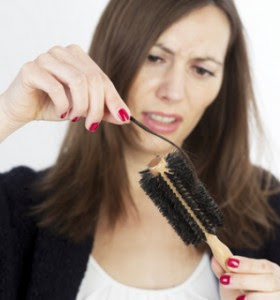Hair loss is a natural process that happens to everyone. It is normal to lose about 50 to 100 hairs every day. However, hair loss can be a symptom and health, even a sign of a serious illness that requires consultation with a dermatologist who can appoint treatment. In the following we present some possible causes of hair loss and how to deal with it ...
1. Telogen efluvium
The female hair loss is observed after pregnancy, major surgery, drastic weight loss or extreme stress. Quantities of hair that we lose much more than usual.
This may be due to the side effects of certain medications such as antidepressants, beta-blockers, and nonsteroidal anti-inflammatory drugs. During telogen hair efluvium goes faster than the hair growth phase to resting phase, before the time of shedding, or "telogen" phase.
Women who suffer from female hair loss, notice more intense hair loss over a period of six weeks to three months after a stressful event for them. There are no tests to determine whether we are affected by the condition. Advice, however, can fix this.
In some cases, such as pregnancy or severe operation will probably take time for the hair loss decrease. If a drug is to blame for a condition should consult with your doctor to reduce the dosage or change the medication.
When the source of the problem is stress - do everything possible to reduce anxiety.
2. Hereditary hair loss
Hair loss that is due to genes, is the most common cause of hair loss, according to the American Academy of Dermatology. It is also known as androgenetic alopecia. Most likely to occur when both parents and there is hair loss.
Hair loss in women, the condition starts with thinning hair at the temples, forehead and above the crown of the head. It develops slowly and can start as early as 20 years of age. Risk women are those in which the process is observed with their mothers.
If these problems can be used minoxidil, which is applied twice daily to the scalp. The drug can be used by both men and women. However, women should not use it if you are pregnant or lactating.
In all cases it is necessary to consult a dermatologist who can determine the exact condition and most adequate treatment.
3. Hypothyroidism
Millions of people, mostly women, suffer from a disease that affects the thyroid gland. When the body produces too little thyroid hormones, which are directly related to metabolism, heart rate and mood, hypothyroidism, or underactive thyroid gland.
If the body produces large quantities of the hormone, then it comes to hyperthyroidism or overactive thyroid.
Thyroid hormones are responsible for many important processes in the body - the use of the metabolism of oxygen and energy needed for growth of hair and nails.
Symptoms characteristic of hypothyroidism are: unexplained weight gain, fatigue, constipation, depression, difficulty in concentration. Hair, skin and nails can become brittle and break more easily. The condition is more common in women over the age of 50 years.
Hyperthyroidism, on the other hand, can cause unexplained weight loss, palpitations, nervousness, irritability, diarrhea, muscle weakness. You can also monitor and hair loss due to accelerated metabolism.
In these cases, your doctor may prescribe medication to restore the normal functioning of the thyroid gland.
Read the sequel: 9 reasons for hair loss in women - Part 2













0 comments:
Post a Comment